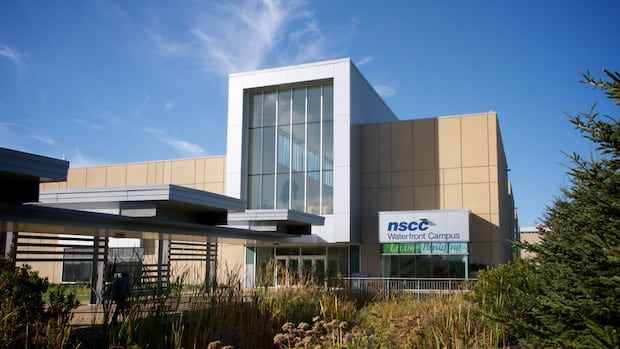Province announces $1.4-million program to have engineering interns help fix health-care roadblocks

Nova Scotia requires a fresh perspective on how to fix the province’s health-care system.
“We’ve been in a system for a very long time and we’ve changed, the system is more complex, our technologies and our health conditions are more complex and the needs that we have,” Health Minister Michelle Thompson said at a Wednesday news conference in the offices of the recently launched Nova Scotia Health Innovation Hub on the 13th floor of the Nova Centre in downtown Halifax.
Thompson, along with Brian Wong, the minister of Advanced Education, announced that the innovation hub and Mitacs, a not-for-profit innovation-empowering organization funded by the federal government and several provincial and territorial governments, are partnering on a $1.4 million grant to embed 42 of Dalhousie University’s top industrial engineering interns and two post-doctoral fellows within the provincial health-care system to solve some of the province’s health-care problems.
The highly trained specialists, under the guidance of some of Canada’s leading academic experts in operational efficiency, will design and implement innovative processes, tools, and technologies.
“The past is not sustainable and we see that every day,” Thompson said. “When we bring in innovations, when we bring in clinicians and researchers, both industrial engineers and other skillsets, they can come in and look at our system in a different way and it absolutely will have a positive impact.
“We need transformation and we need innovation in order to look at the system and how it is unmatched or has not kept up with the demand on the system.”
The innovations are intended to enable Nova Scotians to receive better care with the process and system improvements developed through the five-year project, ensuring the right resources are utilized at the right time.
“You can have a primary-care clinic or a mobile clinic but if it is not effectively used in the community, then it won’t be successful,” Thompson said. “That’s the test-and-try model that we are in. Previously, we were very risk adverse. Everything had to be 100 per cent perfect before we launched it. In fact, when we see those glitches or things that are not successful, those are actually our opportunities to tweak the system even more. That’s the lens that industrial engineers and innovators and researchers bring to any problem that we have.”
Thompson said the new $1.4-million innovation project, funded from Mitacs’ $740,000 contribution and $660,000 from Nova Scotia Health, is one pathway among many others available to the department in its test-and-try model to fix health care.
“This is one significant and important lever in order for us to move and transform health care,” Thompson said.
Nova Scotia Health will work with Dalhousie University to administer the research project to be known as IMPROVE network.
The project consists of seven themes, each building on previous research and industrial engineering studies performed at Nova Scotia Health:
- seamless integration with Emergency Medical Services to ensure the safe, efficient, and cost-effective flow of patients;
- alleviating the waitlist backlog created by COVID-19;
- redesigning hospital units to improve patient flow;
- improving workforce planning and scheduling to support staff working in their areas of expertise;
- developing innovative models of primary care delivery and integration across Nova Scotia that reduce physician wait times;
- developing methods to use economies of scale to improve efficiency, save money, and improve access; and
- dedicating Nova Scotia Health resources and interns to support research and implementation
The innovations generated by the program will enable Nova Scotians to receive better care with the process and system improvements developed through this project, ensuring the right resources are utilized at the right time.
Dr. John Hepburn, Mitacs chief executive officer, said innovation is not about introducing new gadgets, it’s about doing something in a different way to produce better results.

“Transforming health care is one of the most important challenges facing governments in Canada and around the world,” Hepburn said.
“Along with the implementation of high-performance technologies, streamlined processes and industrial engineering tools, this (program) will enable generally transformational change across the entire health system, change that looks like shorter wait times for Nova Scotians to access the care they need, that looks like better ways of moving patients from one unit to another or between facilities, smarter scheduling for hospital staff, new ways of delivering primary care and every health professional working to their full scope of practice.”
Hepburn said Nova Scotia is blessed with 10 world-class universities, an exceptional college system and many high-quality research institutions.
“Nova Scotia is a province where innovation should happen,” he said.
Hepburn said what is missing is that the province and the country are not great at taking advantage of all the talent and skill generated by post-secondary institutions and putting it to work to make Canada more prosperous, productive and innovative.
Hepburn said that’s where Mitacs comes in, formed 25 years ago to create partnerships to transform and transfer the “spectacular stuff” happening in post-secondary institutions into society.
Gail Tomblin Murphy, vice-president of research and innovation and chief nurse executive with Nova Scotia Health, said that accessing primary care is critically important to Nova Scotians and recent provincial disaster situations have shown that mobile primary care clinics make a significant difference.
“Our industrial engineers have worked with us in terms of how do we design these, how close might they be to an emergency, where do they need to be in the community,” Tomblin Murphy said.
“The more that we are working with our industrial engineers and people who understand processes and efficiencies, the more that we know what we need at the unit level, at the facility level and the community level.”



